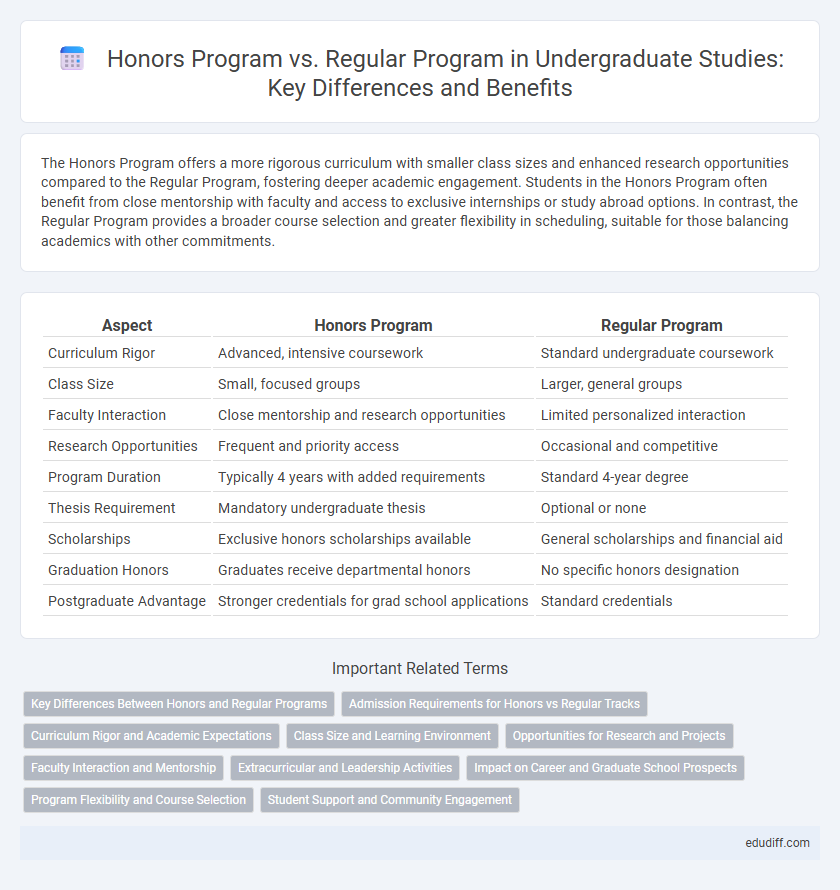The Honors Program offers a more rigorous curriculum with smaller class sizes and enhanced research opportunities compared to the Regular Program, fostering deeper academic engagement. Students in the Honors Program often benefit from close mentorship with faculty and access to exclusive internships or study abroad options. In contrast, the Regular Program provides a broader course selection and greater flexibility in scheduling, suitable for those balancing academics with other commitments.
Table of Comparison
| Aspect | Honors Program | Regular Program |
|---|---|---|
| Curriculum Rigor | Advanced, intensive coursework | Standard undergraduate coursework |
| Class Size | Small, focused groups | Larger, general groups |
| Faculty Interaction | Close mentorship and research opportunities | Limited personalized interaction |
| Research Opportunities | Frequent and priority access | Occasional and competitive |
| Program Duration | Typically 4 years with added requirements | Standard 4-year degree |
| Thesis Requirement | Mandatory undergraduate thesis | Optional or none |
| Scholarships | Exclusive honors scholarships available | General scholarships and financial aid |
| Graduation Honors | Graduates receive departmental honors | No specific honors designation |
| Postgraduate Advantage | Stronger credentials for grad school applications | Standard credentials |
Key Differences Between Honors and Regular Programs
Honors programs offer enriched academic challenges with specialized coursework and smaller class sizes, promoting critical thinking and research opportunities beyond the scope of regular programs. They often provide priority access to faculty mentorship, exclusive seminars, and enhanced resources, fostering deeper engagement and professional development. Regular programs deliver a broad curriculum designed for a diverse student body, focusing on standard graduation requirements without the intensive focus on advanced scholarship characteristic of honors tracks.
Admission Requirements for Honors vs Regular Tracks
Admission requirements for Honors Programs typically demand higher academic performance, with minimum GPA thresholds often set around 3.5 or above, along with recommendations and a personal statement. Regular Programs generally have more flexible criteria, accepting students with average GPAs around 2.5 to 3.0 and fewer supplemental materials. Honors tracks may also require standardized test scores, demonstrated leadership, or extracurricular achievements to qualify.
Curriculum Rigor and Academic Expectations
The Honors Program offers a more rigorous curriculum with advanced coursework that challenges undergraduate students beyond the standard degree requirements. Academic expectations include independent research projects, higher-level critical thinking, and consistent engagement with faculty mentors to foster intellectual growth. In contrast, the Regular Program provides foundational courses with standard assessments, focusing on broad disciplinary knowledge and skill development.
Class Size and Learning Environment
Honors Programs typically feature smaller class sizes, fostering a more interactive and personalized learning environment compared to Regular Programs, which often have larger classes and less individualized attention. The intimate setting in Honors Programs encourages in-depth discussions, closer faculty-student interactions, and collaborative learning experiences. This enhanced academic environment supports higher engagement and tailored intellectual challenges that Regular Programs may not consistently provide.
Opportunities for Research and Projects
The Honors Program offers enhanced opportunities for undergraduate research, including access to faculty-mentored projects, specialized seminars, and funding for independent studies. Students in the Honors Program often participate in original research, leading to publications and conference presentations that are less common in the Regular Program. These experiences provide a competitive advantage for graduate school applications and careers in research-intensive fields.
Faculty Interaction and Mentorship
The Honors Program offers enhanced faculty interaction through smaller class sizes and exclusive seminars, fostering personalized mentorship opportunities that support academic and professional growth. Regular programs typically have larger class sizes, resulting in less individualized attention and fewer chances for one-on-one faculty engagement. Active mentorship in the Honors Program enables students to develop deeper subject expertise and build stronger professional networks compared to the standard undergraduate experience.
Extracurricular and Leadership Activities
Honors Programs often provide more structured opportunities for extracurricular involvement and leadership development, including access to exclusive seminars, research projects, and student organizations that enhance academic and professional growth. Regular Programs offer extracurricular activities but may lack the specialized leadership training and networking events designed to cultivate advanced skills in critical thinking, project management, and community engagement. Participation in Honors Programs frequently leads to stronger resumes and graduate school applications due to the emphasis on leadership roles and collaborative projects aligned with academic excellence.
Impact on Career and Graduate School Prospects
Participation in an undergraduate Honors Program often enhances career prospects by providing specialized research opportunities, closer faculty mentorship, and a rigorous curriculum that appeals to employers and graduate schools. Honors students are more likely to develop critical thinking and advanced skills, increasing competitiveness for prestigious graduate programs and scholarships. In contrast, a Regular Program may offer a broader course selection but generally lacks the same intensity of academic recognition and targeted professional development.
Program Flexibility and Course Selection
Honors Programs offer greater flexibility in course selection, allowing undergraduate students to engage in interdisciplinary studies and access exclusive seminars tailored to their academic interests. Regular Programs typically follow a more structured curriculum with limited elective options, which can restrict opportunities for specialization. Enhanced program flexibility in Honors Programs supports personalized learning pathways and encourages deeper academic exploration.
Student Support and Community Engagement
The Honors Program offers enhanced student support through dedicated advisors, smaller class sizes, and specialized workshops that foster academic excellence and personal growth. Community engagement in the Honors Program is emphasized via exclusive service-learning projects, leadership opportunities, and collaboration with faculty on research initiatives. In contrast, the Regular Program provides standard academic resources and broader campus activities, but with less personalized guidance and fewer targeted community involvement options.
Honors Program vs Regular Program Infographic

 edudiff.com
edudiff.com